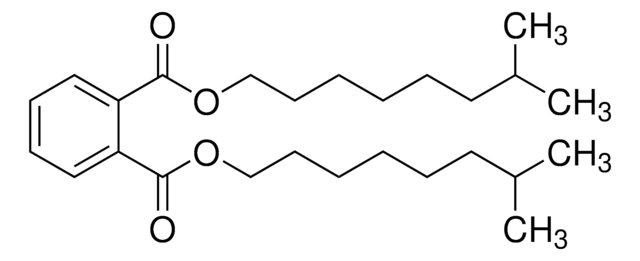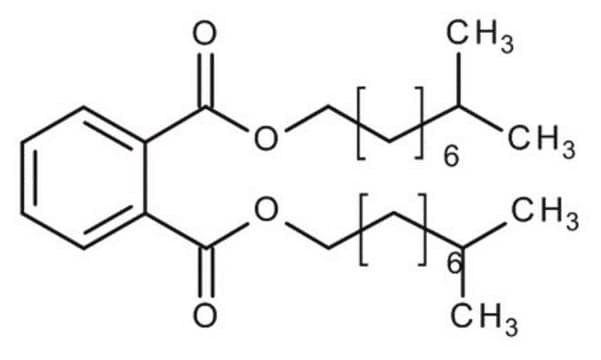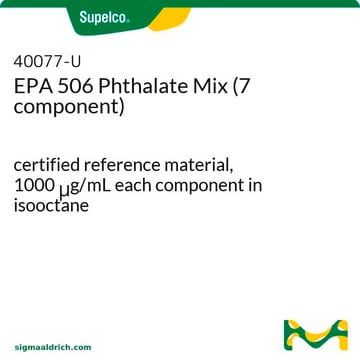88173
Dioctyl phthalate
certified reference material, TraceCERT®, Manufactured by: Sigma-Aldrich Production GmbH, Switzerland
Synonyme(s) :
Phthalic acid di-n-octyl ester
About This Item
Produits recommandés
Qualité
certified reference material
TraceCERT®
Niveau de qualité
Gamme de produits
TraceCERT®
Durée de conservation
limited shelf life, expiry date on the label
Fabricant/nom de marque
Manufactured by: Sigma-Aldrich Production GmbH, Switzerland
Technique(s)
HPLC: suitable
gas chromatography (GC): suitable
Densité
0.980 g/mL at 20 °C (lit.)
Application(s)
environmental
Format
neat
Température de stockage
2-8°C
Chaîne SMILES
CCCCCCCCOC(=O)c1ccccc1C(=O)OCCCCCCCC
InChI
1S/C24H38O4/c1-3-5-7-9-11-15-19-27-23(25)21-17-13-14-18-22(21)24(26)28-20-16-12-10-8-6-4-2/h13-14,17-18H,3-12,15-16,19-20H2,1-2H3
Clé InChI
MQIUGAXCHLFZKX-UHFFFAOYSA-N
Vous recherchez des produits similaires ? Visite Guide de comparaison des produits
Description générale
Certified content by quantitative NMR incl. uncertainty and expiry date are given on the certificate.
Download your certificate at: http://www.sigma-aldrich.com.
Application
Conditionnement
Autres remarques
The collision cross section (CCS) measurement was provided by Waters Corporation, using the SYNAPT XS mass spectrometer.
For a description and overview of how ion mobility enables the measurement of the CCS of an ion visit ims.waters.com.
Further information on the SYNAPT XS mass spectrometer can be found on the IMS microsite and product webpage.
TWCCS measurements are expected to be within 2% of this reference value.
P/N 88173 is part of the Waters Extractables & Leachables UNIFI scientific library which can be downloaded from Waters Marketplace.
Produits recommandés
Informations légales
Mentions de danger
Conseils de prudence
Classification des risques
Aquatic Chronic 4
Code de la classe de stockage
10 - Combustible liquids
Classe de danger pour l'eau (WGK)
WGK 1
Point d'éclair (°F)
228.2 °F - closed cup
Point d'éclair (°C)
109.0 °C - closed cup
Faites votre choix parmi les versions les plus récentes :
Déjà en possession de ce produit ?
Retrouvez la documentation relative aux produits que vous avez récemment achetés dans la Bibliothèque de documents.
Les clients ont également consulté
Notre équipe de scientifiques dispose d'une expérience dans tous les secteurs de la recherche, notamment en sciences de la vie, science des matériaux, synthèse chimique, chromatographie, analyse et dans de nombreux autres domaines..
Contacter notre Service technique





![Benzo[a]pyrène-d12 98 atom % D](/deepweb/assets/sigmaaldrich/product/structures/962/892/b867e1bb-083c-4337-b499-36eae87f40ad/640/b867e1bb-083c-4337-b499-36eae87f40ad.png)






